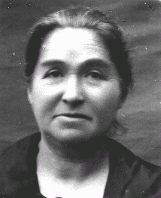You searched for: nazi germany
<< Previous | Displaying results 1076-1100 of 1274 for "nazi germany" | Next >>
-
Jocheved Kuzda Kasher
ID CardJocheved, or Jadza as she was called at home, was born in the industrial city of Lodz, Poland's second-largest city. Before the war, one-third of Lodz's inhabitants were Jewish. The Kuzdas kept a traditional Jewish home and placed importance on their children's education. Jocheved had two older sisters, Sarah and Regina. 1933-39: Jocheved was 9 when the war broke out in September 1939. Instead of starting school, she stayed at home listening to the bombs exploding. Her father and sister tried to get to…
-
Vienna
ArticleNazi Germany annexed Austria in March 1938. Learn about Austria’s capital, Vienna, which at the time was home to a large and vibrant Jewish community.
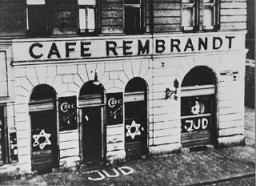
-
The 45th Infantry Division during World War II
ArticleThe 45th Infantry Division participated in major WWII campaigns and is recognized for liberating the Dachau concentration camp in 1945.
-
Art and Survival: György Beifeld's Visual Memoir from the Russian Front, 1942–1943
ArticleGyörgy Beifeld, a Jewish conscript in the Hungarian army, created a visual memoir of his experiences on the eastern front in 1942–1943 as a member of a forced-labor battalion .
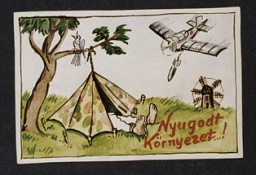
-
William (Bill) Lowenberg describes conditions in the Westerbork camp in the Netherlands
Oral HistoryAs a boy, Bill attended school in Burgsteinfurt, a German town near the Dutch border. After the Nazis came to power in Germany in January 1933, Bill experienced increasing antisemitism and was once attacked on his way to Hebrew school by a boy who threw a knife at him. In 1936, he and his family left Germany for the Netherlands, where they had relatives and thought they would be safe. However, after Germany invaded the Netherlands in May 1940, antisemitic legislation--including the order to wear the Jewish…
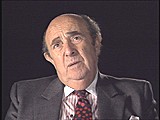
-
William (Bill) Lowenberg describes deportations from the Westerbork camp in the Netherlands
Oral HistoryAs a boy, Bill attended school in Burgsteinfurt, a German town near the Dutch border. After the Nazis came to power in Germany in January 1933, Bill experienced increasing antisemitism and was once attacked on his way to Hebrew school by a boy who threw a knife at him. In 1936, he and his family left Germany for the Netherlands, where they had relatives and thought they would be safe. However, after Germany invaded the Netherlands in May 1940, antisemitic legislation—including the order to wear the…
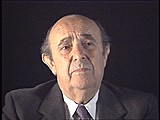
-
Life After the Holocaust: Thomas Buergenthal
ArticleAfter WWII and the fall of the Nazi regime, Holocaust survivors faced the daunting task of rebuilding their lives. Listen to Thomas Buergenthal's story.
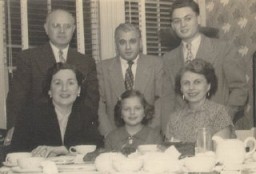
-
Herzogenbusch Main Camp (Vught)
ArticleThe Herzogenbusch concentration camp in the Netherlands began functioning in January 1943. Learn about its establishment, administration, prisoners, and conditions there.
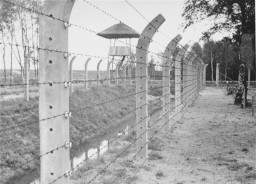
-
Gertrud Gruenbaum
ID CardBorn to a Jewish father and a Catholic mother, Gertrud grew up in Vienna. Trude, as she was affectionately called, attended a public secondary school, where half of her classmates were Jewish. At age 7 she rejected music lessons for classes in dancing and acting. Trude wanted to be like Greta Garbo. She launched an acting career at age 18, assuming the stage name Trude Hermann. 1933-39: Because Gertrud was Jewish she couldn't get acting jobs in Austria and nearby Sudetenland. In 1937 her agent found work…
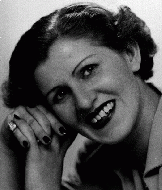
-
Helene Herta Katz Wohlfarth
ID CardHelene, called Herta, was born to a Russian-Jewish father and a German-Jewish mother in a town on the Main River, near Frankfurt. Her father had immigrated to Germany from Russia in 1890. Her mother had automatically taken on her husband's Russian citizenship when she married. In 1914 Russia and Germany went to war, and Russians living in Germany were considered "enemy aliens." 1933-39: Herta married Siegfried Wohlfarth in 1933 and could change from being "stateless" to taking on his German citizenship.…
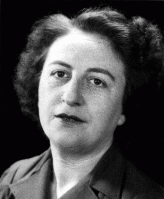
-
Hajj Amin al-Husayni: Key Dates
ArticleKey dates associated with Hajj Amin al-Husayni, former Mufti of Jerusalem who participated in a pro-Axis coup in Iraq in 1941. Explore further
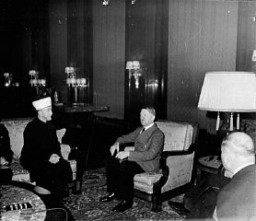
-
Walter Meyer describes his 1943 trial for looting, and the impact of his role in the Edelweiss Pirates on the sentence he received
Oral HistoryWalter was born in Kassel, north central Germany, but grew up in the Rhineland. As a youth, Walter questioned the German superiority and antisemitism he was taught. His father, an anti-Nazi, refused to allow Walter to enter one of the Adolf Hitler Schools, but did permit him to join the Hitler Youth. However, Walter's rebellious streak led him to hide a Jewish friend in his basement. He also formed a gang that played pranks on young Nazis and helped French prisoners of war. They called themselves Edelweiss…
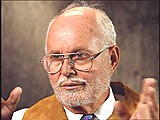
-
1941: Key Dates
ArticleExplore a timeline of key events during 1941 in the history of Nazi Germany, World War II, and the Holocaust.
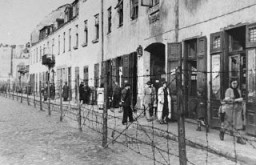
-
Uckermark Youth Camp
ArticleThe Uckermark camp was one of the so-called youth protection camps that the Nazi regime established for young people who were alleged to have strayed from Nazi norms and ideals.
-
William (Bill) Lowenberg describes the importance of bonds of friendship among young people imprisoned in the Westerbork camp
Oral HistoryAs a boy, Bill attended school in Burgsteinfurt, a German town near the Dutch border. After the Nazis came to power in Germany in January 1933, Bill experienced increasing antisemitism and was once attacked on his way to Hebrew school by a boy who threw a knife at him. In 1936, he and his family left Germany for the Netherlands, where they had relatives and thought they would be safe. However, after Germany invaded the Netherlands in May 1940, antisemitic legislation--including the order to wear the Jewish…
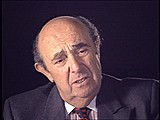
-
William (Bill) Lowenberg describes Zionist and cultural activities in the Westerbork camp
Oral HistoryAs a boy, Bill attended school in Burgsteinfurt, a German town near the Dutch border. After the Nazis came to power in Germany in January 1933, Bill experienced increasing antisemitism and was once attacked on his way to Hebrew school by a boy who threw a knife at him. In 1936, he and his family left Germany for the Netherlands, where they had relatives and thought they would be safe. However, after Germany invaded the Netherlands in May 1940, antisemitic legislation--including the order to wear the Jewish…
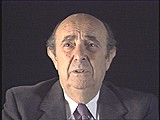
-
Berga-Elster ("Schwalbe V")
ArticleAt the Berga-Elster subcamp of Buchenwald, prisoners were forced to do dangerous and brutal work in tunnels to support fuel production for the German war effort.
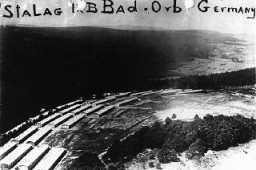
-
Ruth Elisabeth Dahl
ID CardRuth was born into an orthodox Jewish family in Geilenkirchen, a rural German town near the Dutch border. Her father, Isidor, was a respected cattle dealer in the area and her mother, Sophia, took care of the home. Ruth had two older siblings, Edith and Carl. 1933–39: When the Nazis came to power in Germany, life changed in Geilenkirchen. The townspeople supported the new regime and nobody helped their Jewish neighbors. Excluded from public institutions, Ruth attended a private Catholic school. In 1938,…
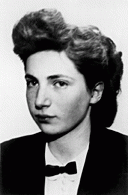
-
Susi Hilsenrath
ID CardThe Hilsenraths lived in Bad Kreuznach, a city in western Germany with a Jewish community that dated back to the 13th century. Susi was the eldest of three children. Her father owned a thriving linen store, and her mother took care of Susi and her two brothers. 1933–39: After the Nazis came to power, the Hilsenraths, like other Jewish families, began to feel the effects of increased antisemitism. Susi was forced to leave the public school, along with the other Jewish children. Even walking on the…
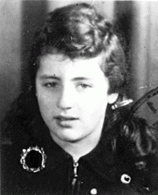
-
Urszula Kaczmarek
ID CardUrszula was one of four children born to Franciszek and Jadwiga Kaczmarek, who lived in the industrial city of Poznan in western Poland. The family lived at 11 Smolnej Street. Like their parents, the Kaczmarek children were baptized in the Roman Catholic faith. 1933-39: As one of the older children in the family, Urszula helped her mother with the housework. She was 10 years old when the Germans invaded Poland on Friday, September 1, 1939. German planes bombed Poznan that same day, and German troops…
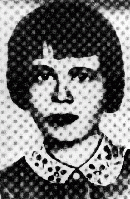
-
Gertruda Nowak
ID CardGertruda was one of five children born to a poor family in the rural community of Zegrowek in western Poland. The Nowaks lived near Gertruda's grandparents. Like their parents, Sylwester and Joanna Nowak, the Nowak children were baptized in the Roman Catholic faith. 1933-39: As a young girl, Gertruda helped with chores around the house, and after school she looked after her younger brothers and sisters. She was 9 years old when the Germans invaded Poland on September 1, 1939. Nazi troops reached Zegrowek…
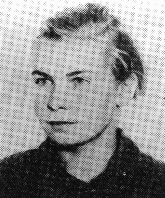
-
Freya Karoline Lang
ID CardAn only child, Freya was born to Jewish parents who lived in a small German town in the Rhine River valley. The Langs owned a successful dry goods business. At this time ready-made clothes were still rare in the countryside. Townspeople and local farmers would purchase fabric at the Lang's store and then take it to their tailor or seamstress to be sewn into a garment. 1933-39: When Freya was growing up, the Nazi party was in power. Many Jews left Germany--Grandmother Lang and one of Freya's uncles sailed…
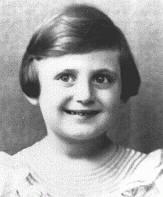
-
Eva Brigitte Marum
ID CardEva Brigitte was the youngest of three children born to German-Jewish parents in the capital of Baden, a state along the Rhine River in southwestern Germany. Known as Brigitte by her friends and classmates, and as "Brix" by her family, she grew up in a secular household and attended public schools. Her father was a local Social Democratic party leader. 1933-39: In 1933 the Nazis came to the Marum's house and arrested Eva's father because he was an active anti-Nazi. Two months later she suddenly saw him…
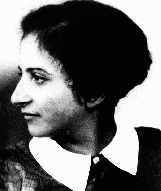
-
Lidia Lebowitz
ID CardThe younger of two sisters, Lidia was born to Jewish parents living in Sarospatak, a small town in northeastern Hungary. Lidia's parents owned a successful dry goods business. At the time, ready-made clothes were still rare in the countryside. Townspeople and local farmers would purchase fabric at the Lebowitz store and then take it to their tailor or seamstress to be sewn into clothes. 1933-39: Lidia was 2 when her Aunt Sadie, who had immigrated to the United States many years earlier, came to visit…
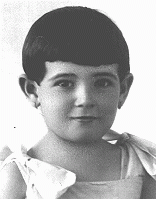
-
Chaia Gurvitz
ID CardFrom a Jewish family, Chaia lived outside Kovno, a city with a large Jewish population that was renowned for its Hebrew school system. Chaia ran a grocery store with her husband, a retired shoemaker, and their daughter Yenta. 1933-39: Chaia is expecting her daughter Feiga, Feiga's husband, Josef, and her grandson, Abraham, for dinner. Feiga works so hard all week in her beauty shop, Chaia is glad she can help out by preparing the big Sunday meal. She has baked a special cake for Abe. Chaia hopes the…
